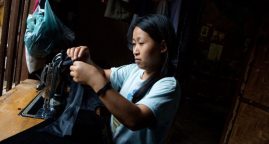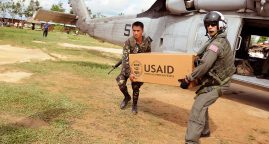Burundi to the edge of chaos
As the economy plunges and the assassinations of opponents multiply, Burundian leaders are radicalized more and more, up to a treatment form the heart of power
In 2015, Burundi became the country in the world where gross domestic product (GDP) per capita is the tiny (315 dollars, around 290 euros). Despite a good coffee harvest. The hotels are empty, dismissing enterprises. “So far, the government came to pay civil servants, one wonders how,” remarks a connoisseur of the economy.
The same government has announced growth outlook (3.6%) for 2016, contrary to the calculations of the International Monetary Fund (IMF) forecasts a contraction of 7% of the economy. Within a few months, the situation will become “untenable”.
The currencies are missing, the Burundi franc is falling. Some local businessmen are leaving the country on tiptoe to escape the demands of “contributions” of power, more and more urgent, says a member of the local employers, which states: “They have received threats from people who know how much money they have in their accounts. There is no neutrality: if you stay you have to pay. So some prefer to go on a trip … ”
More than 400 dead
It has identified to date no businessman assassination, unlike young people, students, activists, former leaders of the demonstrations or unlucky passers over 400 deaths over the past ten months, and the list s’ elongate. Meanwhile, several rebel groups have declared. In addition to Red Tabara, another rebel training was created. The Forebu (Republican Forces of Burundi) brings together senior officers who defected, headed by General Godefroid Niyombare, former fellow traveler of the head of state, which tried to take power at the May 2015 coup . He now lives in exile. can know precisely it is the weight of these movements, but they have in common mix Hutu and Tutsi.
Especially at Kigali, we take an implacable reasoning: the Burundi authority is accused of collusion with genocidal Rwandan Hutu (grouped in the movement of Democratic Forces for the Liberation of Rwanda), to prepare, in essence, the massacre of the Tutsi Burundi. And we do not hide that Rwanda, in this case, intervene to save those who could be.
This conflict only ended in 2005 only after a long process of peace, leaving a country mourns over 200 000 people. Peace was in fact the most desired thing by Burundians. Even the former rebels and soldiers are mixed in a new army with real enthusiasm. Today, this unity is being methodically destroyed.
Read the full article (in french) on Le Temps website
Related Articles
Where do we go from here? 1st Annual Grand Bargain Meeting
06/20/2017. “Together we were determined to reset our ways of working and refocus our efforts on achieving humanitarian gains” Peter Maurer.
Ben Stiller and Social Media Stars Launch ‘Love Army’ to Aid in Somali Crisis
03/22/2017. Celebrities have banded together for a viral fundraising campaign to help offset the humanitarian crisis in Somalia, raising more than $2 million in less a week.
Memo to Congress: Don’t Cut Foreign Aid
06/15/2017. US spend less than 1 percent of the federal budget on foreign assistance.






